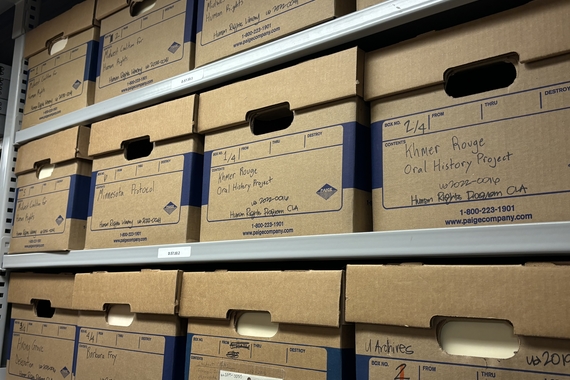MHR Student Reflects on their Experience Visiting the UN in Geneva
For over five years, the Office of the High Commissioner for Human Rights (OHCHR) has partnered with the Human Rights Program by supporting our students with research and internship placement opportunities to prepare them for field work and other important work related to human rights. Read about recent MHR alum Socorro Topete’s experience during her visit to Geneva, Switzerland for the 51st plenary session of the Human Rights Council.
The following reflection has been shortened for clarity.
On October 3, 2022, Sisay Shannon Tamrat and I had the opportunity to attend the 51st session of the Human Rights Council before the Office of the High Commissioner for Human Rights (OHCHR). We were invited to make a statement on behalf of our research team, the University of Minnesota, and the Minneapolis Community about our research on police surveillance and harassment of anti-police brutality in settings outside of protesting. This research followed suit observing the aftermath of the uprising after the murder of George Floyd.
Our invitation followed my research team’s Office of the High Commissioner for Human Rights (OHCHR) Submission of a report condemning law enforcement surveillance and harassment in settings outside of protests. Our publication was in tandem with a OHCHR mandated report titled Promotion and protection of the human rights and fundamental freedoms of Africans and of people of African descent against excessive use of force and other human rights violations by law enforcement officers through transformative change for racial justice and equality.
During my trip to Geneva I also had the privilege of meeting several actors with different responsibilities at the United Nations, and attending the OHCHR 51st session on international human rights violations. Before participating in the 51st session of the United Nations Human Rights Council in October 2022, I believed that I could one day see myself working at the United Nations, creating transcendent change. I learned there's value, and great reward in continuing my journey with on-the-ground human rights defender organizations. I realized how we take for granted the activism that takes place within the communities that face disparities. I always knew it was the on-the-ground activists and scholars who are promoting change, and this trip made me realize that I want to work in that space.
Understanding the limited capacity of the United Nations, I am concerned about the lack of resources and power needed to implement transcendent systemic change. After conversations with grassroots leaders and activists, I feel this is the space in which I can make an impact. The United Nations is not a “save all” mechanism, but certainly has tools to provide a positive impact on larger levels if it further incorporates the views of the communities it aims to serve.
At first, my impressions of the United Nations as a whole were not too bright. With further reflection on the many conversations I had throughout this experience, I realized that It would not be fair to judge the work of the whole organization based on the smaller parts I got to see. If you have seen one nonprofit organization, you have only seen one nonprofit organization. This logic leads me to believe that I shouldn't dismiss the UN as a whole based on my experiences with one UN mechanism, but also consider the impact I could make through other mediums that are not the United Nations directly.
“To navigate the space, you must occupy the space” Is the response I received when I asked how to navigate a space where you feel like an imposter or you don’t fit the mold.
It was the greatest honor to meet with and hear Lamar Bailey make a statement at the United Nations OHCHR 51st session; where she openly stated that simply publishing a report, and country delegates commending these violations is simply not enough. She called on each state to commend and acknowledge the institutional racism that has continued this violence on africans and people of african descent. The most inspiring part of her statement was when she stated that we may never see this happen because these states profit and thrive off this oppression so why would they get rid of a system that was built for them? To see women of color in action at the United Nations the moment I began to envision myself taking space and doing work I never thought I could.
These opportunities left me in a state of reflection for several weeks. I had so many feelings, thoughts, and Ideas going through my head. Who did I want to be as a human rights defender, and what did I want to accomplish in my journey of figuring that out? My personal story is complicated, and full of adversity. I never wanted to allow my experiences to define who I was as a person, academic, or activist. But after speaking with salma, lamar, and colette, I realized we all had something in common. It was not empathy and hunger for justice that got us in that room at the United Nations before the high commissioner of human rights. It was the fact that we all had faced injustice and let down by our governments. We had a common desire to stop others from experiencing our same hurt. That realization changed the game for me. My experiences do not define me but instead fuel the fire within, to fight for what is right. I am a human rights defender not because I have been weakened by traumatic experiences and injustice but because I was strong enough to say no more. No more injustice for me, or my loved ones. No more injustice for my community.
To learn more about the 51st plenary session of the Human Rights Council and the topics brought forth by the University of Minnesota Masters of Human Rights Program, click here.


